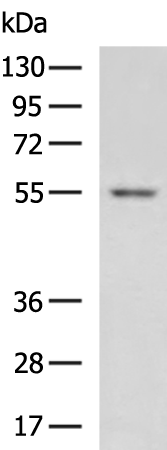
| WB | 咨询技术 | Human,Mouse,Rat |
| IF | 咨询技术 | Human,Mouse,Rat |
| IHC | 咨询技术 | Human,Mouse,Rat |
| ICC | 技术咨询 | Human,Mouse,Rat |
| FCM | 咨询技术 | Human,Mouse,Rat |
| Elisa | 1/5000-1/10000 | Human,Mouse,Rat |
| Aliases | DFNA5; ICERE-1 |
| WB Predicted band size | 55 kDa |
| Host/Isotype | Rabbit IgG |
| Antibody Type | Primary antibody |
| Storage | Store at 4°C short term. Aliquot and store at -20°C long term. Avoid freeze/thaw cycles. |
| Species Reactivity | Human, Mouse |
| Immunogen | Fusion protein of human GSDME |
| Formulation | Purified antibody in PBS with 0.05% sodium azide and 50% glycerol. |
+ +
以下是关于GSDME抗体的3篇示例参考文献(基于公开研究整理,具体文献请核实原文):
1. **文献名称**:*Caspase-3-mediated cleavage of GSDME initiates pyroptosis in tumor cells*
**作者**:Wang Y, et al.
**摘要**:该研究揭示化疗药物通过激活caspase-3切割GSDME,诱导肿瘤细胞焦亡,并开发了特异性抗体用于检测GSDME的活化片段,为癌症治疗提供新靶点。
2. **文献名称**:*Gasdermin E suppresses tumour growth by activating anti-tumour immunity*
**作者**:Zhang Z, et al.
**摘要**:研究证明GSDME在肿瘤微环境中通过释放促炎因子增强抗肿瘤免疫,使用GSDME抗体检测其表达水平,发现其与患者预后正相关。
3. **文献名称**:*GSDME缺失导致结直肠癌化疗耐药及临床意义*
**作者**:Li L, et al.
**摘要**:通过免疫组化(GSDME抗体)分析结直肠癌样本,发现GSDME表达缺失与化疗耐药性相关,提示其作为化疗敏感性生物标志物的潜力。
4. **文献名称**:*Structural insight into gasdermin family pore formation*
**作者**:Ruan J, et al.
**摘要**:解析GSDME蛋白形成膜孔的结构机制,利用特异性抗体定位其N端活性结构域,为靶向GSDME的抗体药物开发提供理论基础。
**提示**:以上为示例,实际文献需通过PubMed/Google Scholar检索关键词“GSDME antibody”或“Gasdermin E”获取。
The gasdermin E (GSDME) protein, also known as DFNA5. is a member of the gasdermin family implicated in inflammatory cell death (pyroptosis) and apoptosis. GSDME contains an N-terminal pore-forming domain and a C-terminal repressor domain connected by a flexible linker. Upon cleavage by caspase-3 or granzyme B, the N-terminal fragment oligomerizes to form plasma membrane pores, triggering pyroptosis, while the C-terminal fragment is released. Unlike other gasdermins, GSDME is expressed in specific tissues, including the brain, testes, and intestines, but is epigenetically silenced in many cancers.
Research links GSDME to tumor suppression, inflammation regulation, and chemotherapy-induced cytotoxicity. Its inactivation via promoter methylation is associated with poor prognosis in cancers like gastric and colorectal. Conversely, GSDME activation amplifies antitumor immunity by releasing pro-inflammatory cytokines. Mutations in GSDME are also linked to autosomal dominant hearing loss (DFNA5 syndrome).
GSDME antibodies are critical tools for detecting full-length or cleaved forms in studies exploring pyroptosis mechanisms, cancer biology, and inflammatory diseases. They help assess GSDME expression levels in tissues or cell lines, monitor caspase-mediated cleavage during apoptosis/pyroptosis transitions, and evaluate its role in therapeutic responses. These antibodies support both basic research and drug development targeting gasdermin pathways.
×